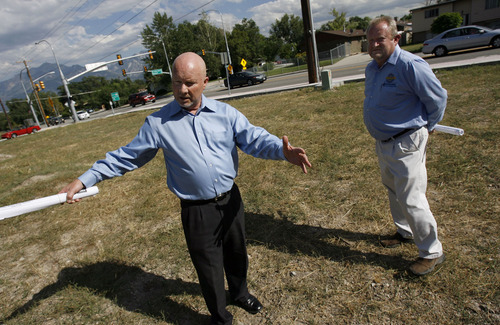This is an archived article that was published on sltrib.com in 2011, and information in the article may be outdated. It is provided only for personal research purposes and may not be reprinted.
The rerouting of the Jordan Canal Road in Taylorsville created a parcel of city-owned land that officials decided was "not a good fit" for sale on the open market.
So, they are considering letting Habitat for Humanity purchase one-third acre for $5,000 — well under fair-market price — so it can build a home for a single mother and her four children.
"I thought this was something we ought to look at," said Mayor Russ Wall, who recently joined the board of Habitat for Humanity. If the City Council approves the sale at a meeting in September, "I'm sure I'll be heavily involved [in the construction of] this one. It's a good organization. I've been impressed with what I've seen."
Construction would begin next spring and take four months to complete.
The mayor said some concerns have been raised about the proposed construction of a single-family dwelling because it replaces a duplex that was torn down on the site at the northwest corner of 2005 West and 6200 South.
"Some are concerned that the home will be a rental; others worry that the style won't fit the neighborhood or that residents won't take care of it," the mayor said.
"My experience is, [Habitat residents] have more into their homes — sweat equity — than most of us do who just go out and get a mortgage."
That's precisely the point of the organization, said Director Ed Blake.
"Our Habitat families need to put in 200 hours of sweat equity" to qualify for the program, which involves volunteers banding to build houses from the ground up for people of limited means.
"They also need to take education classes on such things as managing finances," Blake said.
The mother in this case — Blake declined to identify her until the land deal is approved and she meets all of Habitat's requirements — is performing her sweat equity on a South Salt Lake job site.
Nearly 80 houses have been built across the Salt Lake Valley through the Habitat program. For the one proposed in Taylorsville, "we are looking into kind of pushing our limits a little bit and doing more of a green concept," Blake said, noting that the group wants to explore geothermal heating and cooling.
"If we can take a $200-a-month utility bill down to $30, we are achieving something quite dramatic for a family like this."
He said negotiations are under way with the tradesman program at Salt Lake Community College, where educators are experimenting with teaching geothermal concepts to their students. Such a concept proposes drilling down 120 meters below the home, or nearly 400 feet.
"The Earth's temperature is at 55 degrees F. This can be done anywhere in the valley," Blake said. "Habitat is on the leading edge of green and recycling" in the construction of its homes. The Taylorsville home also would use materials from Habitat's Restore home-improvement thrift store, where private and commercial builders donate leftover tile, among other items.
As for some concerns in Taylorsville about the project, Blake pointed out that of the 79 families who have been awarded homes in the valley, "a majority are still in them. These families have a high propensity for their children going to college [because] when they get grounded in a neighborhood, grades in school improve and they prosper."
And, he said, because of the sweat-equity requirement for owners, the incentive is there for them to properly maintain their properties and to stay put.
Twitter: @utahbiznow



